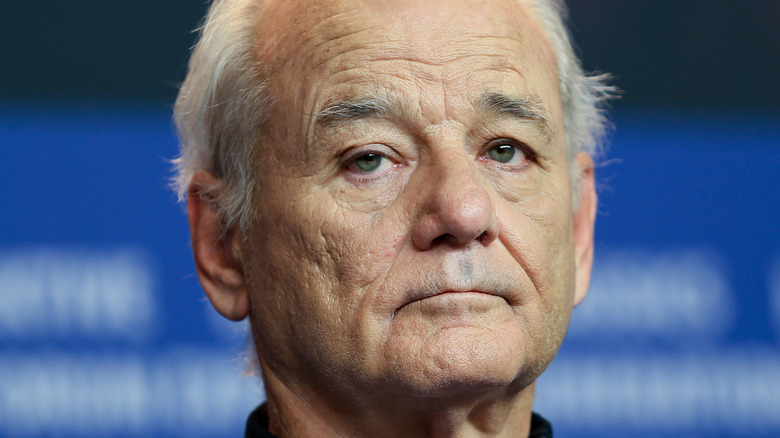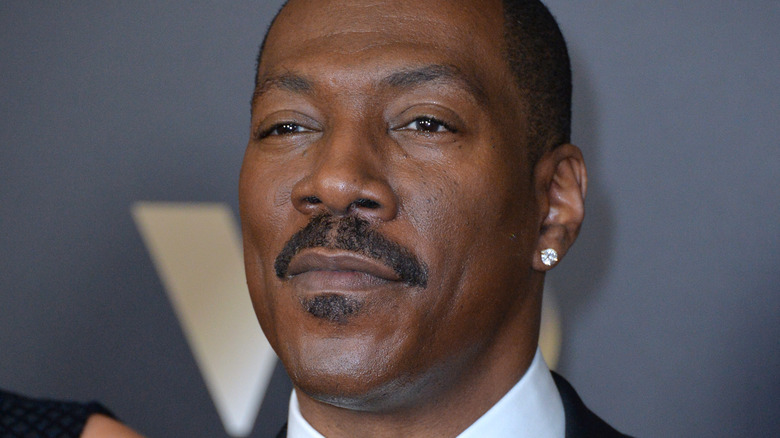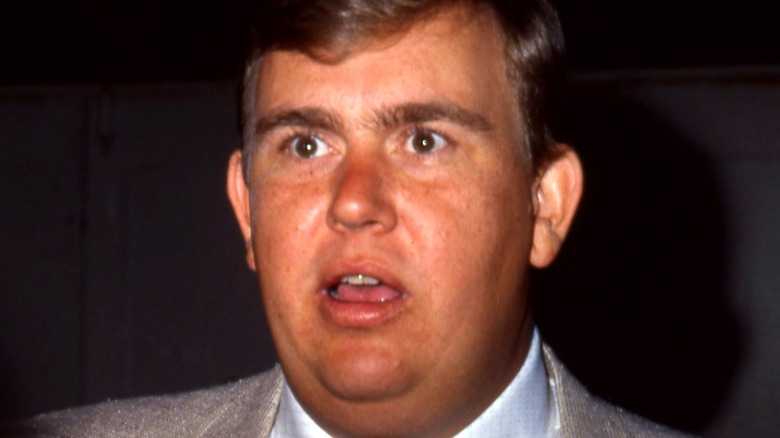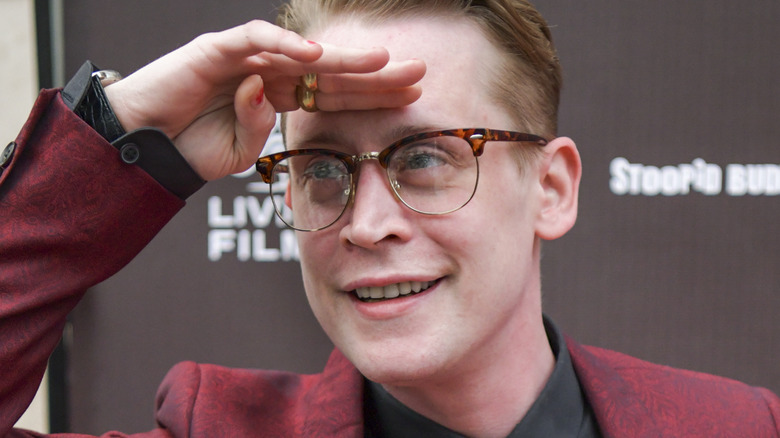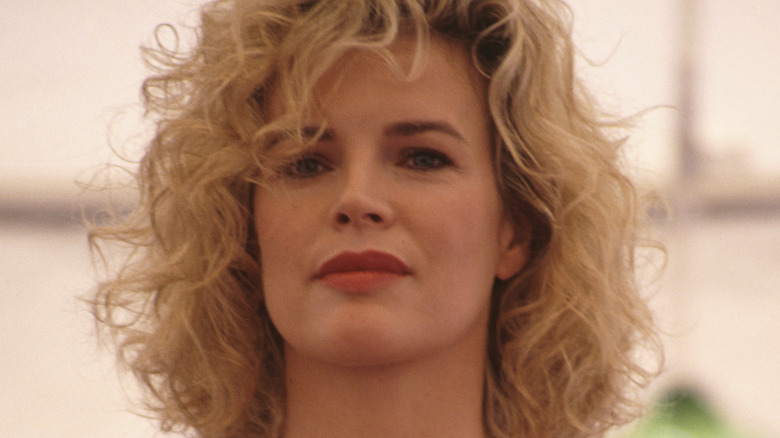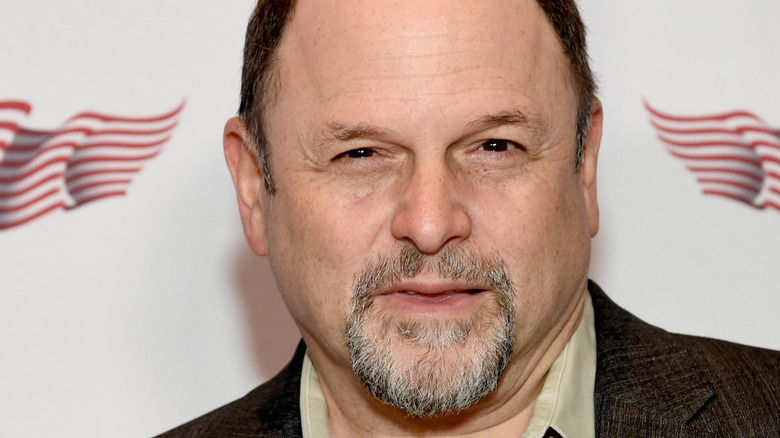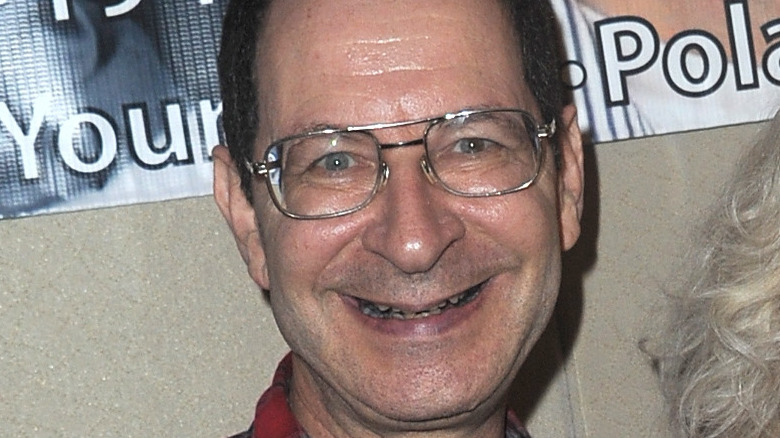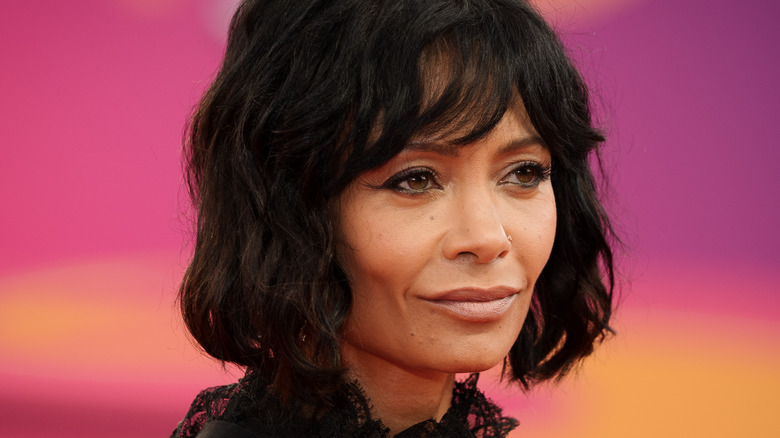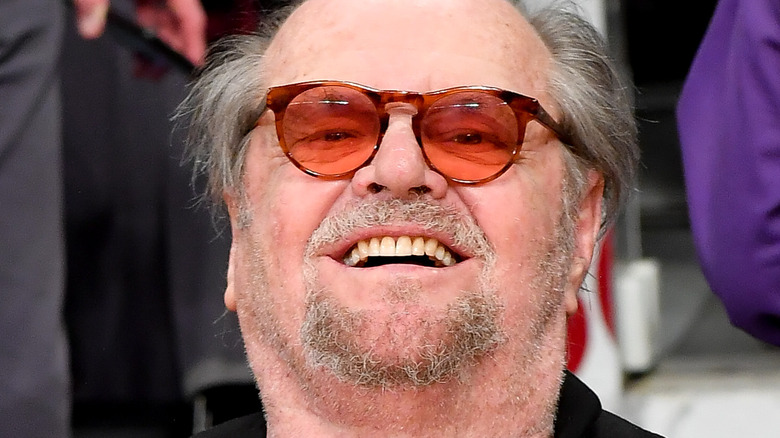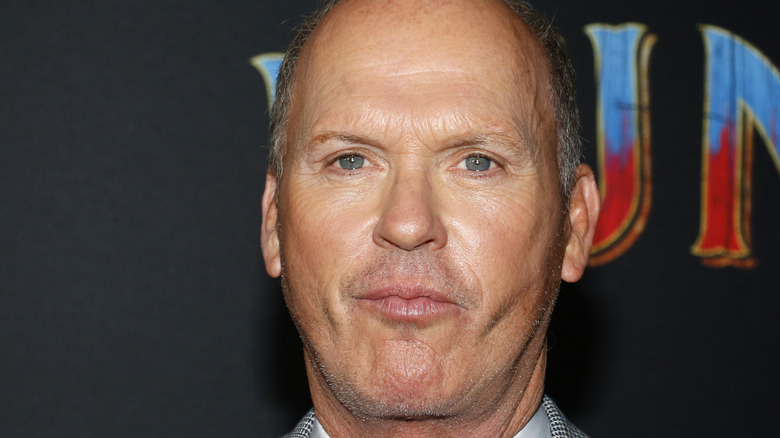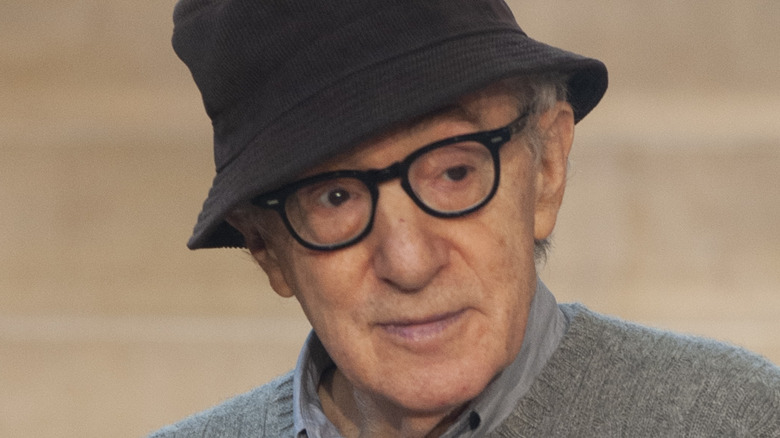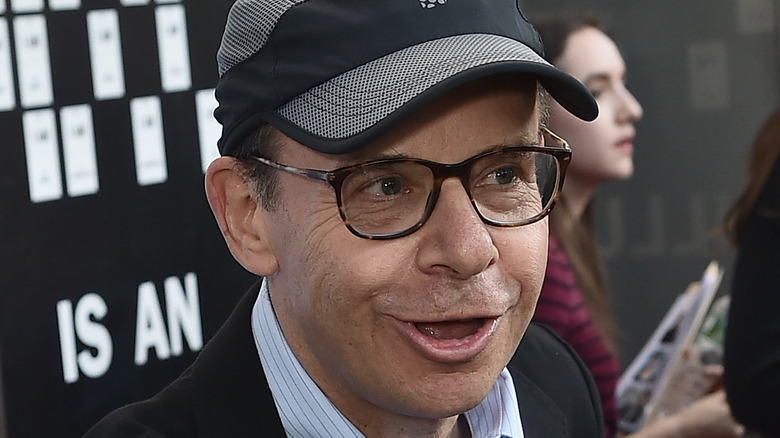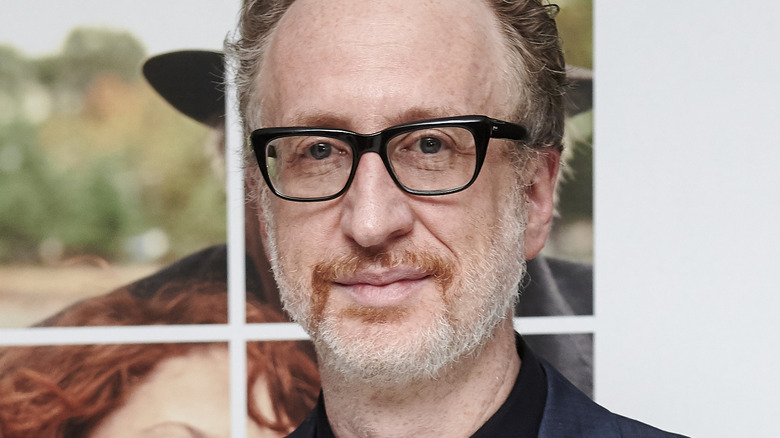Actors Who Refused To Be In Bill Murray Movies
Some actors could be proclaimed "America's Sweetheart" or "America's Dad," but Bill Murray can make a go at being "America's Fun Uncle." A little dangerous, perpetually aloof, and likely to play oafs, ne'er-do-wells, sad sacks, and party animals, Murray is synonymous, and intertwined, with his characters, and delighting audiences with his inscrutability and emotion-driven acting. Since breaking out as a star on "Saturday Night Live" in the late 1970s, Murray went on to become a dominant comic actor of the 1980s, starring in classics like "Caddyshack," "Stripes," and "Ghostbusters." He eventually leaned into "elder statesman of indie auteur cinema" status, collaborating with and serving as a muse to filmmakers including Wes Anderson and Sofia Coppola.
Appearing in a movie with Murray is likely a memorable experience or an artistic exercise, at the least. If not, his co-stars still are attached to projects that will garner a lot of attention from Murray's legions of fans and from millions of moviegoers. But some of Hollywood's biggest stars and most in-demand character actors have turned down the opportunity. Here are the performers who just couldn't say yes to being in a movie with Bill Murray.
Eddie Murphy made another big comedy instead of Ghostbusters
"Ghostbusters" represented the largest cinematic ascent yet for the early stars of "Saturday Night Live," once billed as the "Not Ready for Prime-Time Players," leading to a sci-fi comedy blockbuster and a milestone comedy of the 1980s. Dan Aykroyd co-wrote the film with "SCTV" star and "Caddyshack" director Harold Ramis, and they starred as kooky discredited scientists Raymond Stantz and Egon Spengler, respectively, who rent a firehouse and an ambulance and start a spirit-trapping business that eventually saves New York City from destruction. They were joined by Bill Murray as the flirtatious, wisecracking Peter Venkman. Portraying Winston Zeddemore, the fourth ghostbuster, was character actor Ernie Hudson, who landed the role after yet another "SNL" superstar said no to the project.
"I was supposed to be in 'Ghostbusters,'" Eddie Murphy told Parade, explaining that Aykroyd mentioned the role of Zeddemore when they were working on "Trading Places" together. "But then 'Beverly Hills Cop' came along." That film made him a star — and it landed atop the 1984 box office leaders, just ahead of "Ghostbusters." "I wish I could have been in both," Murphy lamented.
John Candy couldn't do what he wanted to in Ghostbusters
Cast members from two of the edgiest comedy shows in the late 1970s and early 1980s also starred in "Ghostbusters": Bill Murray and Dan Aykroyd from "Saturday Night Live," and Harold Ramis and Rick Moranis from "SCTV." Another major comic figure from the era, "SCTV" veteran John Candy, was included in the casting plans for the movie too. While writing the screenplay for "Ghostbusters" with Ramis, Aykroyd conjured the role of goofy accountant and neighbor Louis Tully expressly for Candy. It was intended to be a riff on Johnny LaRue, his arrogant, odious womanizer character from "SCTV."
"John Candy was supposed to be the neighbor down the hall, but he didn't like the treatment that I had sent," director Ivan Reitman told Entertainment Weekly. "He didn't get it." Candy suggested that he play the character as a German man who shares his apartment with a large number of dogs. "I said, 'Well, maybe you can do it with an accent, but I don't think all that's really necessary,'" Reitman recalled. Still unmoved, Candy passed on the role, which went to Moranis.
Macaulay Culkin was too 'retired' to do Rushmore
After decades in well-received broad-appeal comedies, Bill Murray delved into more understated independent film work in the late 1990s and earned some of the strongest critical praise of his career. In Wes Anderson's 1998 comedy "Rushmore," Murray portrayed depressed industrialist Herman J. Blume, who strikes up a friendship with Max Fischer, an enterprising private-school student, while competing with him for the heart of kindergarten teacher Rosemary (Olivia Williams).
"Rushmore" featured an audacious debut screen performance by teen actor Jason Schwartzman as Max, a role that almost went to a young actor with a lot more experience and box-office potential to his name: Macaulay Culkin, who as a child starred in "Home Alone" and "My Girl." In January 2018, Culkin participated in an "Ask Me Anything" Q&A session for Reddit, and a reader inquired if there were any movies he was offered that he came to regret after passing. "I was sent the script to 'Rushmore,'" Culkin revealed. "I was still retired then," he added, alluding to the period from 1995 to 2003 in which he didn't appear in any movies.
Kim Basinger's rep wanted too much money for Stripes
A former pageant winner and model, Kim Basinger broke into acting in the late 1970s, landing one-off roles in a string of episodic TV dramas and movies-of-the-week. She finally landed her first leading film role in the 1981 country-music drama "Hard Country." That film was shot around the same time as "Stripes," a much bigger box-office hit. It also made a way-bigger cultural footprint as one of the best-known Bill Murray movies of them all.
Basinger had essentially locked down the role of "Stripes" romantic lead Stella in the comedy about two slackers who join the U.S. Army for kicks. But her agent asked for a $200,000 salary for his mostly unproven client. That request was a non-starter for producers of the relatively low-budget "Stripes." Basinger departed the movie, and P.J. Soles was hired to replace her.
Jason Alexander ceded a Space Jam role to a Seinfeld co-star
The partially animated and partially live-action 1996 family sports sci-fi comedy "Space Jam" not only marked the feature-film debut of basketball superstar Michael Jordan, it was also one of very few movies based on TV commercials. According to the Chicago Tribune, "Space Jam" — in which Jordan, as himself, leads a basketball team of Looney Tunes characters in a fateful game against evil aliens — originated as a television spot for Nike that featured Jordan acting opposite Bugs Bunny. In the early 1990s, Bill Murray also starred in several ambitious NBA commercials. He played himself, and the premise was that he "promised" to quit acting in order to follow his true love: basketball.
That basically guaranteed Murray a role, as an exaggerated version of himself, when Warner Bros. put "Space Jam" into production. Director Joe Pytka had a much harder time casting the part of Jordan's sycophantic publicist, Stan Podolak. Pytka's first choice was Michael J. Fox, who bowed out. So did Murray's fellow "Saturday Night Live" alumnus Chevy Chase. Jason Alexander, at the time co-starring on the megahit sitcom "Seinfeld" as George Costanza, politely declined, per the Chicago Tribune. Pytka finally found his actor elsewhere on that show: Wayne Knight, nefarious mailman Newman, got the role.
Eddie Deezen worked with a different SNL star in Meatballs
Eddie Deezen can reasonably stake a claim as the "definitive nerd" working in movies today. The character actor has repeatedly played the stereotypical geeky dweeb, featuring a braying voice, prominent glasses, and other cliché traits. Deezen portrayed that "brand" a lot in late-1970s and early-1980s youthful comedies, including "I Wanna Hold Your Hand," "Grease," "Grease 2," "WarGames," and "1941." "Meatballs," a hit summer-camp comedy starring Bill Murray, was one of that period's few major broad comedies with a nerd character in which Deezen didn't play his signature type.
It was Murray's first movie role, as lead counselor Tripper Harrison. Deezen was offered the role of Spaz, a mega-nerdy object of ridicule, but he couldn't do it. When "Meatballs" was filming, Deezen had already committed to a role in "1941," starring Murray's "SNL" cohorts John Belushi and Dan Aykroyd. "If I hadn't done '1941,' I would have been in 'Meatballs,'" Deezen told Rogue Cinema. "I would have loved working with Bill Murray."
Thandiwe Newton left Charlie's Angels, alleging offensive behavior by a director and a studio exec
English actor Thandiwe Newton has enjoyed a successful high-profile career, starring in HBO's acclaimed "Westworld," the Academy Award-winning "Crash," "Mission: Impossible II," and "Interview With the Vampire." In 2000, she secured what would've been her biggest film role to that point, Sony's big-screen version of the 1970s "Charlie's Angels" TV show, about a trio of spies. According to Vulture, Newton had experienced trauma from abuse of a sexual nature in the film industry. On "Charlie's Angels" (in which Bill Murray played the Angels' handler, Bosley), director McG sent some charged comments in her direction, and she walked away. He had explained his idea for an opening shot: What looked like yellow dotted lines on a road were revealed to be stitching on a tight pair of black jeans Newton was supposed to wear. "I was like, 'Oh, I don't think we're going to go down this road,'" she said.
Newton voiced her concerns to Sony head Amy Pascal, but the actor claimed that the exec dismissed them. "She said, 'Look, I don't mean to be politically incorrect, but the character as written and you playing the role, I just feel like we've got to make sure that it's believable." Pascal also listed what Newton, an actor of Zimbabwean heritage, called "stereotypes of how to be more convincing as a Black character." That exchange helped solidify Newton's decision to leave "Charlie's Angels."
St. Vincent arrived too late for Jack Nicholson
In the 1970s and 1980s, Jack Nicholson was one of Hollywood's most versatile and charismatic actors, often playing charming rogues and likable bad guys. He won his first of three Academy Awards for playing a restless revolt-leading mental-institution patient in "One Flew Over the Cuckoo's Nest," and in the 1989 blockbuster screen adaptation of "Batman," he played the Joker with such zest and star power that he received top billing over Michael Keaton, who filled the title role. Starting in the late '90s, the aging Nicholson adjusted his acting choices accordingly, playing a string of elderly grumps and curmudgeons in films like "As Good As it Gets," "About Schmidt," and "How Do You Know."
To that end, Nicholson got an offer to play the title role in the 2014 movie "St. Vincent": Vincent McKenna, a retired and restless war veteran who's befriended by a single mother and her bullied young son. But Nicholson turned it down, per the Boston Globe. He hadn't appeared in a movie since 2010, and according to the Sydney Morning Herald, he is essentially retired. That opened the big role in "St. Vincent," and it went to Bill Murray.
Michael Keaton didn't like the creative turns Kingpin took
The 1996 bowling/road trip/redemption comedy "Kingpin" traveled a long and arduous path to the screen. Bill Murray co-starred as arrogant and flashy pro bowler Ernie McCracken, all sneers and bad attitude directed at his fallen rival Roy Munson, who's attempting a comeback by mentoring a bowling savant he found in Amish country. Woody Harrelson played Roy Munson, but according to Variety, Michael Keaton signed a deal to star in the movie, which was sold to Rysher Entertainment in November 1994 on the condition that he'd star and that at least one of the Farrelly brothers ("Dumb and Dumber") would direct the script, written by Barry Fanaro and Mort Nathan.
But because Keaton wanted to also star in "Multiplicity," "Kingpin" producers rearranged their film's schedule. Then, before "Kingpin" began shooting, Keaton quit the movie when he read a new draft of the script and found that it had been completely rewritten to be more of a joke-based comedy than a character study. Filmmakers even reportedly offered to shoot from the original screenplay, but Keaton couldn't be persuaded to stay.
What about Woody Allen in What About Bob?
After making his name in the 1960s as a stand-up comedian behind a stage persona of a self-loathing and nervous guy, Woody Allen turned to filmmaking. Between 1971 and 2000, he wrote and directed movies at a rate of about one per year. He usually starred in them, too, which left little time for projects in which he didn't have full creative control.
In the 1990s, he headed the casts of just two feature films, "Scenes from a Mall" and "Antz" — and he nearly co-starred with Bill Murray in the comedy "What About Bob?" The film, which opened in 1991, starred Murray as a therapy-addicted, phobia-addled man whose analyst is on a family vacation while being terrorized by Murray's character. In 1989, the Los Angeles Times announced that production had started on the film, already delayed after Robin Williams bowed out. At that point, Murray was on board as the patient, with Allen in talks to play the psychiatrist. The director originally signed was Garry Marshall, but Allen was a contender to not only star but also direct and take a crack at the screenplay. Allen wound up not being involved with "What About Bob?" in any capacity because he couldn't get out of his exclusive contract with Orion Pictures.
Rick Moranis didn't answer the call for Ghostbusters revival
The 2016 "Ghostbusters" franchise reboot was marketed as "Ghostbusters" but quietly subtitled "Answer the Call" to differentiate it from the 1984 original and the 1989 sequel. Something of a continuation and remake of the original movie, "Ghostbusters: Answer the Call" told a similar story — about disgraced New York City scientists and professors who became heroic ghost-catchers — and also starred "Saturday Night Live" cast members Kristen Wiig, Leslie Jones, and Kate McKinnon. Some original "Ghostbusters" actors popped up in new roles, including Annie Potts (Janine in "Ghostbusters"), as a desk clerk, and Bill Murray, formerly main ghostbuster Peter Venkman, as supernatural-events debunker Martin Heiss.
At least one other '80s "Ghostbusters" cast member was set to make an appearance in the 21st-century "Ghostbusters." Filmmakers offered Rick Moranis, who had played nerdy accountant Louis Tully, a cameo. He declined the chance. "I wish them well. I hope it's terrific," Moranis told The Hollywood Reporter months before "Answer the Call" hit theaters. "But it just makes no sense to me. Why would I do just one day of shooting on something I did 30 years ago?"
James Gray couldn't take the time out to appear in The Life Aquatic
Beginning with "Rushmore" in 1998, every feature film made by acclaimed indie filmmaker Wes Anderson has featured Bill Murray in some way. He's the lead in Anderson's 2004 dramedy "The Life Aquatic With Steve Zissou," portraying the title character, a world-renowned sea-life documentarian in a deep funk following a divorce and the death of his best friend.
James Gray almost landed a role in "The Life Aquatic," despite not being much of an actor. He's a writer and director, best known for "Ad Astra" and "We Own the Night," and he played a small role in the 1997 film "Love Jones," but his scenes were cut. Anderson aggressively pursued his fellow filmmaker for a brief bit in "The Life Aquatic," promising a fun two to three weeks of shooting in Rome.
"I'm thinking, 'No way, no way.' I didn't understand why he wanted to cast me, but he's a friend and probably as a consequence wanted some form of revenge," Gray told IndieWire. Nevertheless, Gray signed on, for the part of documentary film-score composer Wolodarsky. But then he received the shooting schedule, which would have required him to spend five months in Italy. "So I said no," Gray added. The role went to Noah Taylor instead.
